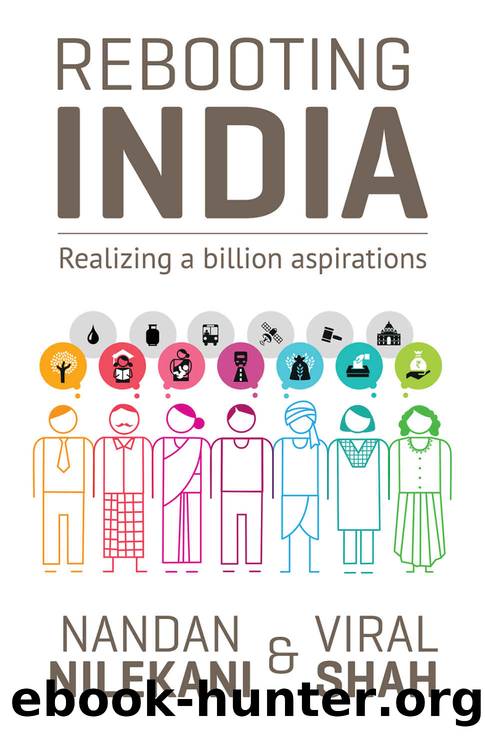Rebooting India: Realizing a Billion Aspirations by Nilekani Nandan & Shah Viral

Author:Nilekani, Nandan & Shah, Viral
Language: eng
Format: epub
ISBN: 978-8-184-75084-3
Publisher: Penguin Books Ltd
Published: 2015-11-02T16:00:00+00:00
Thinking big: An ecosystem beyond just toll
Once every vehicle carries a radio tag linked to a payment account, we now have a national network that can be used for many things other than just toll payments. As Palekar puts it, ‘The tag becomes a unique identifier for the vehicle, and can be used for many applications beyond toll alone. It works as an automated vehicle identification system, and the ETC is just one application of that.’ A prepaid toll system that works across banks and spans the entire nation can be used for other types of transportation-related payments. This could include paying for local tolls in states and cities, parking charges, fines for traffic violations, road and vehicle tax, and any other transaction requiring payment from the user.
Another extension of the ETC system can be towards reducing traffic snarls by levying a congestion tax. In such cities as London and Singapore, users are charged a fee for operating a vehicle in some areas during peak hour, helping to reduce the traffic burden.14 The best we have managed in India so far is to ban commercial vehicles from entering urban areas during certain hours. In Mumbai, for example, trucks are not allowed to ply inside the city during the day, and can only enter at nightfall; however, this system doesn’t extend to all major cities in the country. Being stuck in a typical peak-hour Bengaluru traffic jam, surrounded by vehicles ranging from sputtering scooters to ramshackle trucks groaning under the weight of rocks or sand destined for construction sites, is sufficient to convince us of the value of a congestion tax in making everyday travel a less nightmarish experience. Transceivers mounted at the appropriate locations—the city limits or the borders of the business district—can be used to scan the radio tags of vehicles entering the area, and users would then be charged a congestion fee electronically. Alternatively, if the decongestion approach involves banning the entry of vehicles except during a specified time period, the RFID system could be used to flag offenders and levy fines.
Today, vehicles have to stop at state borders to hand over their manifests and undergo inspection, which wastes time and lowers transport efficiency. Truck delays at checkpoints cost the economy an estimated Rs 9 billion to 23 billion in lost operating hours. A perverse economy has sprung up in which truck operators pay bribes to officials to avoid paying taxes on their goods, or fines for overloading their vehicles. A World Bank study estimates that these ‘facilitation payments’ can run anywhere from Rs 9 billion to 72 billion. The net result is that the state loses money due to it in the form of tax. Officials overlook violations of traffic safety laws, and this contributes to even larger economic and social losses from accidents that could otherwise have been prevented. The annual economic loss from road accidents is estimated to be in excess of Rs 550 billion, and the majority of these accidents involve trucks.15
With the ability
Download
This site does not store any files on its server. We only index and link to content provided by other sites. Please contact the content providers to delete copyright contents if any and email us, we'll remove relevant links or contents immediately.
Hit Refresh by Satya Nadella(8338)
The Compound Effect by Darren Hardy(7560)
Change Your Questions, Change Your Life by Marilee Adams(6641)
Nudge - Improving Decisions about Health, Wealth, and Happiness by Thaler Sunstein(6633)
The Black Swan by Nassim Nicholas Taleb(6192)
Daring Greatly by Brene Brown(5642)
Deep Work by Cal Newport(5465)
Principles: Life and Work by Ray Dalio(5322)
Rich Dad Poor Dad by Robert T. Kiyosaki(5149)
The Myth of the Strong Leader by Archie Brown(4789)
Man-made Catastrophes and Risk Information Concealment by Dmitry Chernov & Didier Sornette(4736)
Big Magic: Creative Living Beyond Fear by Elizabeth Gilbert(4723)
The Slight Edge by Jeff Olson(4722)
Discipline Equals Freedom by Jocko Willink(4636)
Digital Minimalism by Cal Newport;(4544)
The Motivation Myth by Jeff Haden(4528)
Stone's Rules by Roger Stone(4416)
Management Strategies for the Cloud Revolution: How Cloud Computing Is Transforming Business and Why You Can't Afford to Be Left Behind by Charles Babcock(4131)
The Doodle Revolution by Sunni Brown(4043)
